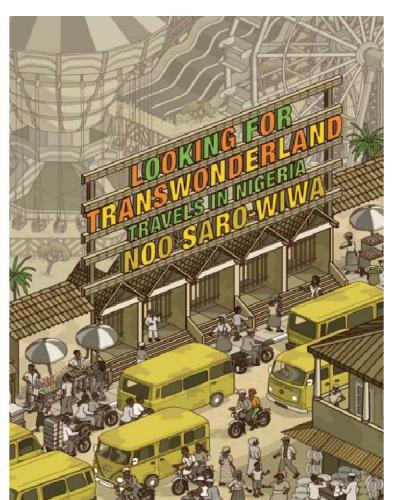
Looking for Transwonderland
Travels in Nigeria
کتاب های مرتبط
- اطلاعات
- نقد و بررسی
- دیدگاه کاربران
نقد و بررسی

July 9, 2012
In this combination travel narrative and personal memoir, Noo, who was raised in England, seeks to explore and understand the country where she was born as well as her father, Ken Saro-Wiwa, a respected Nigerian writer, television producer, and environmental activist who was executed on false charges by the Abacha military regime in 1995. Many of her observations are bleakly comical: the “Transwonderland” of the title, an amusement park touted in a travel guide, turns out to be a few rusting carnival rides surrounded by unmowed grass and perplexed children who can’t afford to ride them. Others are tragic: unreliable public infrastructure, the decay of historic sites, and the theft of artworks. Most damaging of all is the absence of the social contract whereby work is honestly done and honestly rewarded. Employers delay payment of wages for months; public servants seek bribes; government funds are repeatedly squandered or embezzled. In a passage that is all the more stirring for its emotional restraint, Saro-Wiwa describes how she and her family received the skeletal remains of her father in 2005. She has come to love some things about Nigeria—its natural beauty, its fascinating indigenous heritages, its music and dancing—but finds that her native land “couldn’t seduce me fully when all roads snaked back to corruption, the rottenness my father fought against and the cause he died for.”

July 1, 2012
A Nigerian-born English journalist makes peace with the land that killed her father. Ken Saro-Wiwa was a Nigerian nonviolent political activist campaigning against government corruption and environmental degradation when he was falsely accused by the military regime and executed in 1995. His daughter Noo, a twin to her sister, Zina, born in 1976 and educated in England and the United States, maintained a mostly antagonistic relationship toward the land of her Ogoni parents, who sent the children on summer holidays back to the family compound where the heat, disorder, lack of running water and electricity consumed the author with dread. Now a young woman self-admittedly spoiled by the amenities of English life, the author allows her love-hate relationship with Nigeria to flavor this thoughtful travel journal, lending it irony, wit and frankness, yet also an undertone of bitterness. Starting in Lagos, staying at the home of her mother's friend, she was overwhelmed by the noise and tumult of the city, teeming with 300-odd ethnic groups that were miraculously not worn down by quotidian inconveniences such as five-hour commutes, poorly paid jobs ($2 at most per day) and a constant need for haggling and hustling to make ends meet. Indeed, a Pentecostal faith inspired many Nigerians, rendering them by one account the happiest people in the world. From Lagos, "feral and impenetrable," Saro-Wiwa trekked through Nigerian land and history, to the university town of Ibadan, the modern urban metropolis of Abuja, Kano and the Islamic northern recesses, national parks and nature preserves, civic-minded Calabar and formerly glorious Benin, before facing the "tense oil-city" and difficult childhood memories of Port Harcourt. A vigorous, scathing look at Nigeria then and now.
COPYRIGHT(2012) Kirkus Reviews, ALL RIGHTS RESERVED.

August 1, 2012
Experience the chaos of Nigeria through the eyes of Saro-Wiwa, the daughter of the famed activist Ken Saro-Wiwa, who was executed by the Nigerian government. Saro-Wiwa grew up in England, though she returned every summer to Nigeria, a place she loathed because it took her away from her comfortable lifestyle. As an adult, Saro-Wiwa found herself wondering about her homeland, the country for which her father gave his life, and decided to return. Enlivened by charismatic characters, bus ride infomercials, abandoned amusement parks, corruption, and gorgeous rain forests, Saro-Wiwa's memoir is as much a tale of frustration as it is a journey of discovery. VERDICT This engaging, fast-paced jaunt through more than a dozen regions of Nigeria is full of adventure and honesty. Saro-Wiwa writes beautifully of her homeland and family, opening this world up for outsiders. Recommended for those who love experiencing new countries in the pages of a book, fans of memoir, and anyone interested in contemporary Nigeria.--Katie Lawrence, Chicago
Copyright 2012 Library Journal, LLC Used with permission.

Starred review from September 15, 2012
The daughter of slain Nigerian activist Ken Saro-Wiwa revisits her homeland as an adult in this absorbing tour of that complex African country. As a child, Saro-Wiwa resented being pulled from her life in London to be shuttled off to Nigeria with her family. Now she devotes several months to getting to know the country as an adult. She begins her journey in Lagos, staying with a family friend and braving perilous public transportation to visit the heart of the Nigerian oil industry, a local museum, and a beach, where she's courted by a charming con man. She finds the new capital of Abuja, where her older brother now lives, cleaner and less congested than Lagos, but it lacks the former capital's lively character. Saro-Wiwa had high hopes for Transwonderland, an amusement park built in Ibadan, but it's run-down and essentially deserted. As she tours the country and gets to know people from its many ethnic groups, she gains a better understanding of and appreciation for Nigeria. Saro-Wiwa is a sharp and insightful guide, giving readers an intimate look at the varied regions that comprise this fascinating country.(Reprinted with permission of Booklist, copyright 2012, American Library Association.)

























دیدگاه کاربران